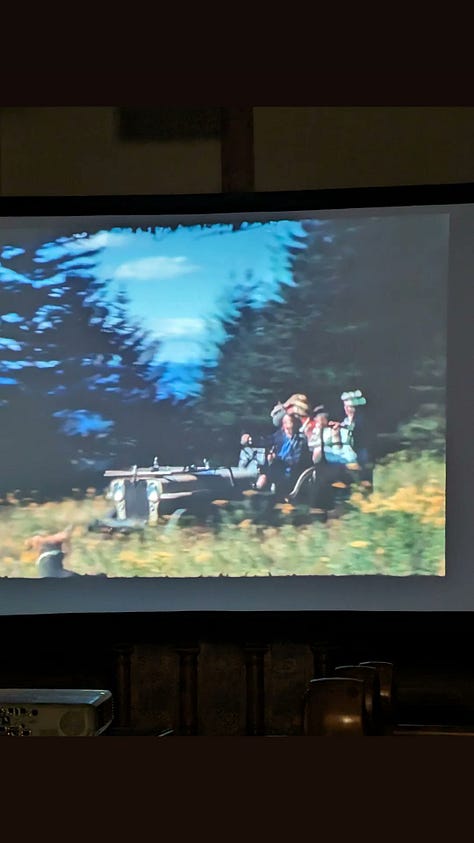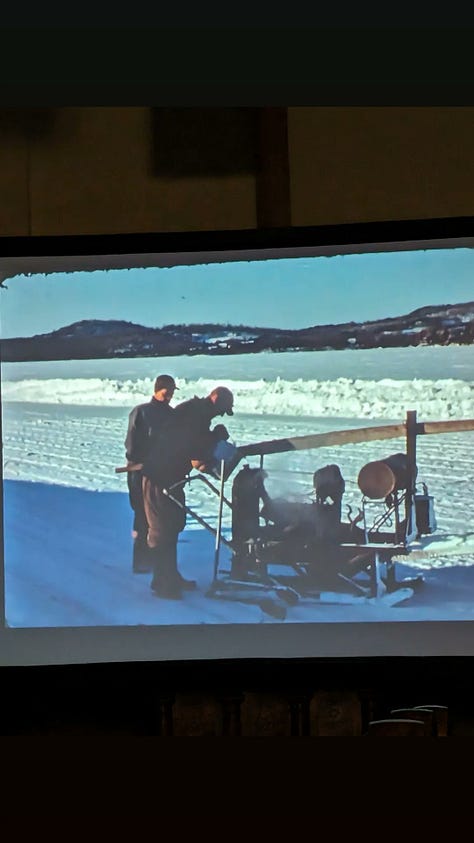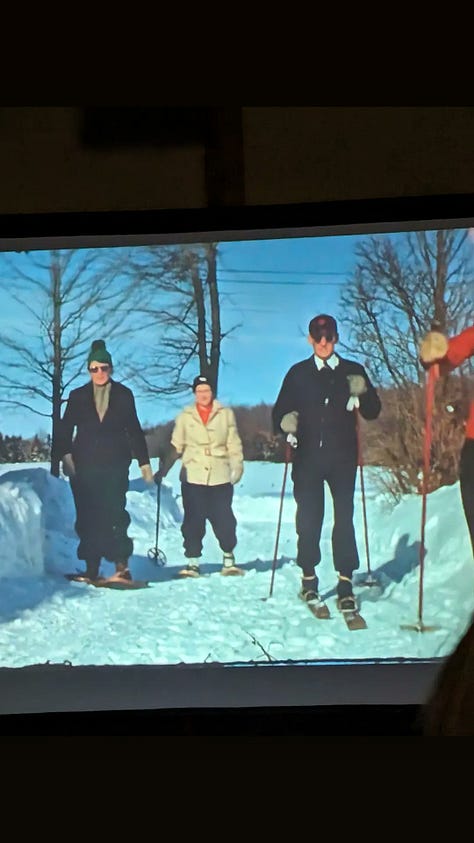The Fullness of Time
On Christ and the clock
While we were young, we were in bondage to the elemental spirits of the world. But when the fullness of time had come, God sent his Son, born of a woman, born under the law, in order to redeem those who were under the law, so that we might receive adoption as children. And because you are children, God has sent the Spirit of his Son into our hearts, crying, “Abba! Father!”
So you are no longer a slave but a child, and if a child then also an heir through God.
Galatians 4:3-7
In one of our culture’s last unifying holidays of New Year’s Eve, it’s easy to get overly sentimental in our stock-taking and grand plans-making. It’s a time to evaluate and celebrate, and most importantly, to send a reminder to our network about all we accomplished and why we are still worth associating with.1 It’s also easy to get overly cynical and depressed at what could have been. Some will feel nothing more ceremonial than noticing the bottom-right of your laptop no longer ends with “2023.”
This week, I am indulging in all these moods. But I also could not help but notice the almost throwaway phrase in the above Galatians passage: “the fullness of time.”
The phrase in context is most plainly making a reference to the ripe timing of the birth of Christ as part of a divine plan. But meditating on the fullness of time—in Greek, πλήρωμα τοῦ χρόνου, or “pléróma tou chronos”—concords with the mysterious relationship between God, time, and our ongoing spiritual pilgrimage.
Traveling Magic
Just a few weeks ago, my church hosted our local library to share home movies from almost 100 years ago made by folks in our Vermont farming village (here’s a thread with some clips).



The turnout was a success with locals from neighboring towns, some stepping into a church for the only time all year. Folks flocked to see flavors of the Old Ways, and we were delighted to see echoes of what is still here in Craftsbury, yet so different. It invited instant, unspeakable reflection on the dueling natures of change and continuity, how much we were wrong back then about one thing or another for one reason or another, but also how foolish we were not to grasp what we had—and we weren’t even there to have it!
There was magic in the room that, I dare say, often feels absent from rote worship. While watching old movies of ice-harvesting farmers and picnicking ladies and wooden ski-jumping teens feels like the best form of time travel, worship too often feels like its worst form: being stuck in an older time.
Now, in one sense, I think tradition and worship should be a form of collective resistance to time’s endless march. But rather than being reactionary, I think one way to approach our shared faith as basking in the pléróma—fullness, fulfillment, completion—of time. This is what I felt in the film projector’s glow. What does that mean?
Most preachers, after a couple of years, have at least had one “chronos vs. kairos” sermon to distinguish between different biblical concepts of time. While that has some relevance here, I’ll shamelessly leave it to others to carry that weight. Parsing what kind of timing God has doesn’t explain why a timeless God would have to come into our time at all. I’m more interested in the base assumption within Paul’s pléróma, the belief that time can be fulfilled, that there is something about time that makes it perfectible by something else. I’ll explore some of that here.
Along with this, I suppose I’m still asking “why him”—why worship a time-bound, gender-bound, culturally- and religiously-bound man as the center of something that we claim to be cosmic and universal? I’ll stab at this, too.
To both, I believe the answer lies in specifics and finitude. Just as anything particular has more universality than generalizations, we in our time-boundedness can only know a God beyond time by how he shows up within time.
Us Against the Clock
Secularity is obsessed with time, and we are all ordered around by it, and we all know it. In fact, because time (like love) is one of the most adage-ready concepts, it can be hard to say anything new about it. It heals all wounds, only it tells, it’s a flat circle, and there’s none of it that’s like the present (or in my favorite inversion from David LaMotte, there’s “no present like time”). Enya and Ben Folds and Pink Floyd and Cyndi Lauper and so many more have made their artistic thesis statements on temporality. Comedians from George Carlin to five thousand open micers have had something to say about it (and I’m not about to drudge up any of my old terrible bits).
We manage time, we find time, we buy time, we sell our time…all this has been seen before and named before because time itself is timeless. We ferociously study and devote whole institutions to what has lasted throughout time. Some self-helpers have coined the term “lindy” as that which has been useful to humanity for a long time. We even have new advances in time manipulation that have nothing to do with patented Apple Watches; by virtue of their favorite chemicals, psychonauts experience time-dilation in an imitation of God’s thousand-year days,2 or at least five hours in fifteen minutes.
While lacking faith in a future, conscious existence, much of secularity is still religious in its look to the future via the coveted “right side of history”—aka the right side of time’s justice. Only the details have changed in humanity’s eternal thirst for immortality.
This is all hardly an indictment of secularity. Time terrorizes Christians even more.
Christianity has fixated on the end times since its beginning times, and the historical Jesus was most likely an apocalyptic prophet. Thus there has always been an urgency to discipleship, but patience and sacrifice: we are called to give up time towards worship and serving others. Some of us do this in hopes of avoiding the Eternal No of hell to be welcomed into God’s Eternal Yes. We pray that those who do not get justice in this temporary world receive a more everlasting justice. Scripture gives us ideas of heaven, but we don’t know what a forever with God looks like…we just know it will at least be forever.
And that’s just the future. Christianity is just as fervently dictated by its relationship to the past. Our books are from there, our heroes live there, and the keys to perfecting our salvation are in there if only we could all agree. When you boil down to it, the basis of all denominational splits can be spliced by differences in relating to history. But we all speak of and follow a man whose body left long ago (and even then, these are Eucharistic fighting words).
Even our texts of the past live at temporal crossroads, most notably the Hebrew prophets. While some churches hardly pay attention to their discomforting words, they all still live in our Bible as particular flashpoints of time. Sometimes we venerate them because they predicted things that would happen later. Sometimes we venerate them less for predicting the future than for describing their present with poetic ferocity. In either case, we still read them because their words are evergreen to us in the present.
As a result of all this, a Christian’s relationship with time can strain and creak and sometimes break. For if we are ruled by time, it is only because we are ruled by death. And if we are ruled by death, it is only because we are ruled by time. Dying is just death across time, and we’re all dying.
The third prong of this unholy trinity, intimately related to the other two, is sin. The state of sin—our estrangement from complete union with the eternal God—is what makes us subject to both death and time. If sin is original (that is, inherent to our existence), it is because our lives are in perpetual exile from eternity. We are “living on borrowed time” from before the ink dries on our birth certificate’s T.O.B.
If Christianity’s relationship to time is weird and imperfect, perhaps even delusional and insane to the outside, it is because it dares to defy death through embrace. While the human temptation is to reject our participation in sin and helplessly try to control time as a means of hopelessly avoiding our death, the Way believes in accepting our powerlessness to all three, depending utterly on God.
Which brings us back to pléróma. For those of us who believe in God, we must utterly depend on God because only God can relate to time independently at all. No other thing can relate to time from outside of it—all are bound in it. We’re not just dying, the whole thing is all dying.
Yet in God, it is all living.
Specific Matters
In Christianity, we believe that in one sense, the fullness of time was an event—the “perfect timing” precondition of Christ’s coming—as well as an ongoing state, for in Christ, God has made time complete, perfect, and fulfilled. But I think this can lead us to some dead-ends.
Some give all sorts of extrabiblical guesses as to why Christ’s incarnation was the perfect historical time. These range from the ubiquitous nature of the Greek language to the Jewish expectancy of a Messiah to the Roman Empire’s travel system making the Gospel amenable to evangelism. Eventually, this historical analysis goes, the Roman elite saw something pragmatic to its purposes in Christianity, and in their mass conversions spread Christianity even more. These and other analyses presume to know a lot about divine plans and God’s timing. I would suggest they are misguided in order to serve one narrative or another.
And we aren’t special in seeing a “full” time, for an atheistic “flat circle” can also acknowledge a perfect completeness of time, too. In either case, we can each agree that we in the present are in the middle of something four-dimensionally whole. If time is a vinyl, we have no choice but to ride the needle.
But if we believe God is truly all in all and has already made the world and time perfect, some might wonder: isn’t it backwards, outdated, and stuck-in-the-past for Christians to want to believe that a universal God manifested as a particular Jewish man in a specific time and place, in believing through him instead of believing in “the Universe” or a more inclusive, pan-religious Higher Power?
Many would say so. The crunchiest of Christians out there believe in panentheism and process theology and argue for a God who is always working in all things and creation. This has a resemblance to New Age spiritualites and Unitarian Universalism, both of which I spent several years in. I still believe that God has worked through and spoken through many different religions, and love learning from other religious people. But I also believe in the particular and peculiar nature of the Christian message.
This paradox holds for me because I believe you cannot get to the universal in any way besides the specific. This is, of course, an old writing adage, but it is not just for communication’s sake. The person who can tell the story of a forest has deeper knowledge than the textbook—though both help in synergy. Living in a small town tells us more than sociologies about them.
In this way, I found some of these other spiritual maps lacking. They rightly identify the universal nature of God while resisting the excesses of religious exclusion and legalism. But to the extent they do not accept our finitude in its full extent, nor focus on the depth found in the particular, many spiritualities actually water down the human relationship to the Universal by trying to universalize it. In my experience, what’s left is ego games. The desire to obtain knowledge of the universal is a symptom of our intellectual greed, a heady gluttony. It can only be thwarted by yearning to know through the singular Other.
And so Christians believe that through God’s entrance into specific time and place, in God making himself finite, we get something universal and eternal. The divinity of All Time can only be glimpsed in the depth of a short time. While we cannot fully know, see, or grasp God, we believe that in Jesus Christ, God made himself knowable enough. Through an abridged incarnation, God built a bridge to the unlimited.
We live in the fullness of time and all its pléróma, but we cannot hope to understand it as it is. In the middle of All Time, Christians step into the shadow of the sundial, seeking out the Alpha/Omega as the One breaking through and broken in Christ’s body. It is the Son’s narrow gate of specificity that brings us to the Father of all.
Free Time
Heirs, as long as they are young, are no better than those who are enslaved, though they are the owners of all the property, but they remain under guardians and trustees until the date set by the father. So with us; while we were young, we were enslaved to the elemental spirits of the world.
Galatians 4:1-3
If we cannot yet be beyond time, what are we to do in the meantime?
One last important bit of context to Galatians is Paul telling his readers of their prior state of enslavement. He makes an analogy of our spiritual state to young Roman heirs to a household. These heirs were called “young masters,” but very much did not have ownership or mastery over anything in their life, still ordered around by elders and superiors as they learned right from wrong.3 Paul says this is like how we were before Christ—enslaved to the “elemental principles,” or spirits, of the world. But “for freedom Christ has set us free,” not as a license for the un-freedom in self-indulgence, but to serve one another.4 However free we are in Christ, the “already/not yet” nature of this world means we can be—and will be, and are—back in the bondage of the powers of the world. This includes our bondage to time.
Thus, we can only learn about freedom in infinity through practicing how to act in our finitude. Monastics have long modeled this by living out of cultural time while keeping to an even more disciplined rhythm of life. Most of us will not be monks. But if we want to know how to live more in Christ’s eternity, we can take a closer look at a core daily practice of most Christian monastic traditions: praying the Psalms.
I remember first getting into Christian mysticism and finding this off-putting. As we have discussed, the Bible is a time-oriented book, and in many ways a product of its time. Yet within this, the Psalms speak with a voice that is remarkably outside of time. They cover the spectrum of human emotions and relationships to God, yet are constantly threaded by and concluded in praise.
The lectionary reading this week is one such psalm of praise, number 148. I invite you to read it as words that draw us out of our clocks:
Praise the Lord.
Praise the Lord from the heavens;
praise him in the heights above.
Praise him, all his angels;
praise him, all his heavenly hosts.
Praise him, sun and moon;
praise him, all you shining stars.
Praise him, you highest heavens
and you waters above the skies.Let them praise the name of the Lord,
for at his command they were created,
and he established them for ever and ever—
he issued a decree that will never pass away.Praise the Lord from the earth,
you great sea creatures and all ocean depths,
lightning and hail, snow and clouds,
stormy winds that do his bidding,
you mountains and all hills,
fruit trees and all cedars,
wild animals and all cattle,
small creatures and flying birds,
kings of the earth and all nations,
you princes and all rulers on earth,
young men and women,
old men and children.Let them praise the name of the Lord,
for his name alone is exalted;
his splendor is above the earth and the heavens.
And he has raised up for his people a horn,
the praise of all his faithful servants,
of Israel, the people close to his heart.Praise the Lord.
Psalm 148
We cannot pray our way out of time, but praise comes close. We praise God because God is above time and comes into time, both its Source and outside of it, the eternity and the life everlasting. And in praising, we practice putting ourselves in communion with this holy eternity. There is more to be said here, but we know such generalities are futile attempts to universalize; nothing can explain prayer as well as your consistent, personal prayers to the God who sees you and knows you in the depth of your peculiarity.
This desire to know us—know you—is why Jesus Christ came into time. We Christians so often say it because it so often needs saying. Jesus became like one of us in our finitude, like us in being caught by time. And in defeating death, he also defeated time. It is less that Christ came in the fullness of time and more that Christ is time’s fullness—its completion, perfection, filling, fulfilling, and ever-ripening.
I hope that in 2024 and all the years to come, we can bask in the fullness of God’s time. We give praise that we are no longer heirs of false gods, “young masters” of time, but children of the eternal God. Our time may be short. But it is free.
Let the reader understand I sincerely enjoy hearing reflections on your accomplishments from the year.
2 Peter 3:8
Philip Graham Ryken, Galatians
Galatians 5





Enjoyed reading this. Time’s so fluid sometimes; I don’t imagine Jesus checking his phone to see what time it is and how many followers he has - but there’s some value in our technology. Except when my phone doesn’t work.
I noticed that you capitalized Eternal No and Eternal Yes. It made me think of Nietzsche’s eternal yes; funny to pair this most famous atheist with Christ. Did you have Nietzsche in mind when you wrote this?